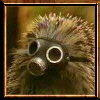
Book 3 of the first Foundation trilogy
Rating: 3 out of 5
This is the final book of Isaac Asimov's first Foundation trilogy, which was started with Foundation and continued with Foundation and Empire. The first story arc of that small outpost of knowledge at the edge of the galaxy, trying to shorten the projected 30,000 years of chaos to a mere 1,000 years by following the plans of Hari Seldon and his science of psychohistory, is coming to a close. But the Foundation, based on the planet Terminus, which has risen from obscurity to replace the Galactic Empire as the premier civilization in the galaxy has fallen to the powerful mutant known as the Mule. The long-dead Hari Seldon's well laid plan for the future is in ruins.
Or is it? For it seems that Hari Seldon has indeed planned for every contingency and has established a Second Foundation in an unknown location. This Second Foundation is the direct opposite of the First Foundation which had depended on physical science to develop their society. Instead of using physical science, the Second Foundation was composed of "psychohistorians" and developed a few mental capablities that access the human mind and having the directive of making sure Hari Seldon's plans would be fulfilled under any circumstances. These are capabilities which the Mule, now the undisputed ruler of the galaxy, consider a threat to his existence. So he devices a plan to find the Second Foundation and crush it once and for all.
The book Second Foundation, similar to the second book, is actually divided into two story arcs. The first details the aforementioned search of the Second Foundation by the Mule, followed by the story of the inheritors of the First Foundation making their own search for the Second Foundation, which they deem, for reasons to be mentioned in the book, as a threat to their own humanity.
The clean and simple style of Asimov's writing remain. It is, however, still flavored with that mid-20th century style that admittedly makes his writing somewhat outdated and the dialogue a little bit cheezy. And it is clear that sometimes the best scientific minds don't make the best artistic style which may turn away contemporary readers and may not have the impact it had 2 to 5 decades ago. Asimov could be very logical in his approach to storytelling that he sometimes forgets that actual people are involved in the events he presents. For example, his telling of a battle scene in space has the atmosphere of watching a video game where the destruction of vessels and the losing of lives are presented as casually and "unfeelingly" as can possibly be.
Having said that, Asimov presents ideas that are astounding even today and presents his own thesis in some aspect of the story of humanity. This landmark work, along with other books of the series, is a must-read for science fiction fans, if only for the importance it had with the genre. And with this series, along with his other works, Isaac Asimov demonstrates why he is one of the most brilliant minds of the 20th century and one of its greatest writers, if just in terms of ideas, and not in style. His first Foundation trilogy is a true classic.

